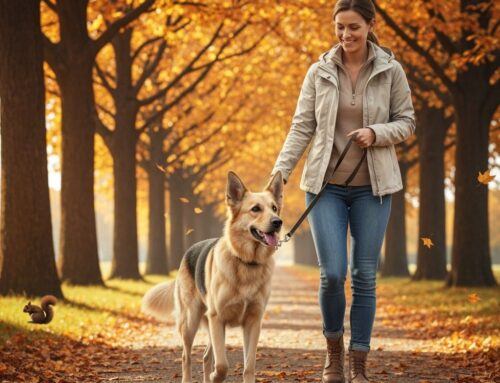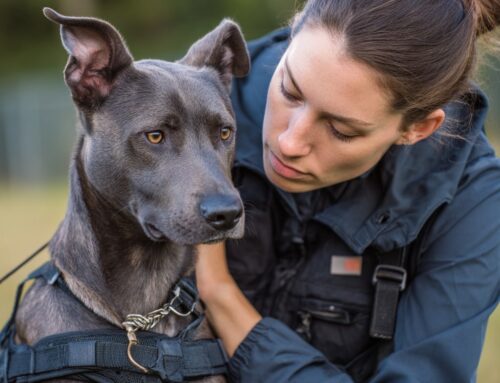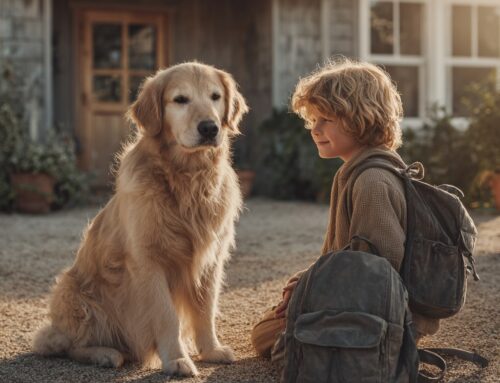Dogs, much like humans, can experience stress and anxiety for various reasons. Whether it’s due to a change in environment, loud noises, separation from their owners, or health issues, stress can significantly impact a dog’s overall well-being and behavior. Understanding and addressing these stressors is crucial for ensuring that our canine companions live happy, healthy lives. We’ll get into various effective stress reduction techniques for dogs.
Understanding Canine Stress
Before diving into the techniques, it’s essential to understand what stress in dogs looks like and how we as pet parents can point out those stressful situations to remember for the future. Common signs of stress in dogs include:
- Excessive barking or whining
- Pacing or restlessness
- Destructive behavior (chewing, digging)
- Changes in eating or sleeping patterns
- Excessive licking or grooming
- Trembling or shaking
- Avoidance or hiding
- Separation anxiety
If you notice any of these signs in your dog, it’s crucial to identify the source of the stress and address it appropriately in the stressed out pets so it can be mitigated quickly so your pup will feel better, relieve stress and get comfortable sooner.
Effective Stress Reduction Techniques
Exercise and Play
Physical activity is one of the most effective ways to reduce stress in dogs. Regular exercise helps to release endorphins, which are natural stress relievers and overall good for your dog’s physical health. Activities such as walks, runs, playing fetch, or engaging in agility training not only provide physical benefits but also stimulate your dog’s mind and relieves those stressed dogs.
- Walks and Runs: Daily walks or runs provide a change of scenery and an opportunity for your dog to explore new scents and sights. This can be very stimulating and stress-relieving while giving your dog the physical exercise it needs.
- Play: Engaging your dog in play, whether it’s a game of fetch, tug-of-war, or chasing bubbles, can help reduce stress and build a stronger bond between you and your dog.
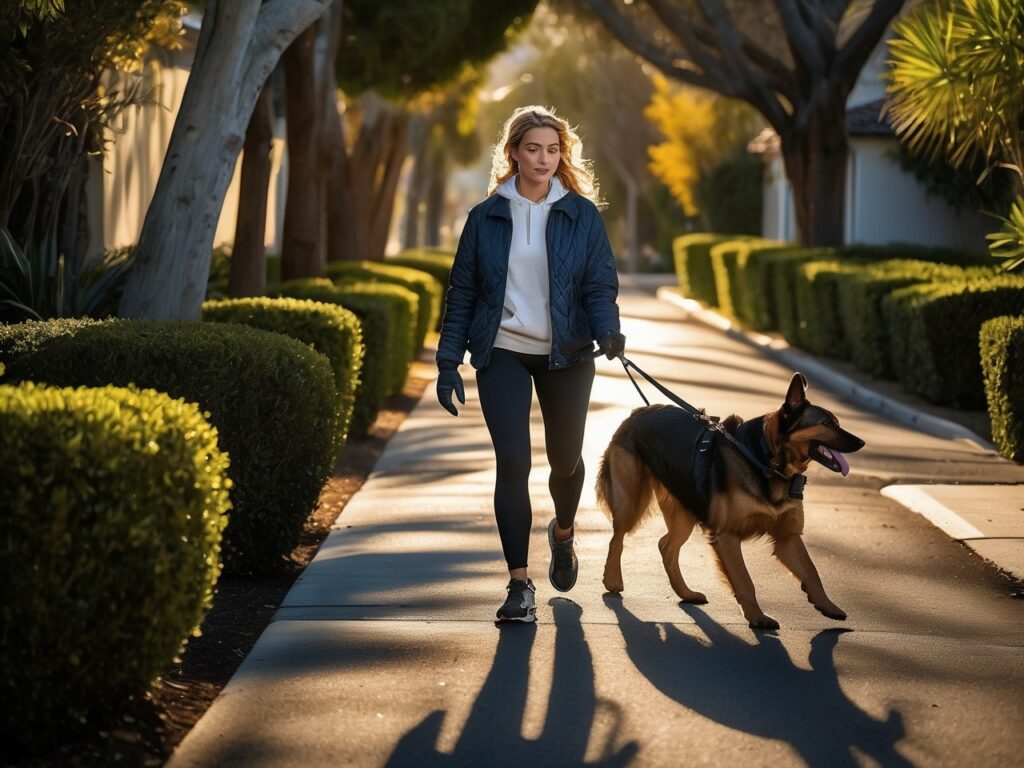
Routine and Structure
Dogs thrive on routine and structure. A predictable schedule for feeding, walks, playtime, and bedtime helps them feel secure and reduces anxiety.
- Feeding Schedule: Feed your dog at the same times every day. This predictability can provide comfort.
- Walks and Play: Schedule walks and play sessions at consistent times. This helps your dog know what to expect and when. And when a dog knows it’s time to walk or play, it can be a great stress reducer in your dog’s anxiety knowing that they have a schedule for a walk or playtime.
Safe Space
Providing a safe, quiet place for your dog to retreat when feeling stressed is essential. This could be a crate, a specific room, or a cozy bed. Ensure that this space is comfortable and free from loud noises and disturbances.
- Crate Training: If your dog is comfortable in a crate, it can serve as a secure den where they can relax.
- Designated Area: Create a designated area in your home where your dog feels safe and can go to decompress.
Mental Stimulation
Keeping your dog mentally engaged can significantly reduce stress. Boredom can lead to anxiety, so it’s essential to provide activities that challenge their mind.
- Puzzle Toys: Toys that require your dog to solve problems to get a treat can keep them occupied and mentally stimulated.
- Interactive Games: Games like hide and seek, or training sessions that involve learning new commands, can provide mental stimulation.

Positive Reinforcement Training
Using positive reinforcement techniques to train your dog can help build their confidence and reduce stress. Rewarding your dog with treats, praise, or play for good behavior encourages them to repeat these behaviors.
- Reward-Based Training: Focus on rewarding good behavior rather than punishing bad behavior. This approach helps to build trust and reduces anxiety.
- Consistency: Be consistent with commands and rewards to avoid confusion and stress.
Calming Products
Several products on the market can help reduce stress in dogs. These include pheromone diffusers, anxiety wraps, and calming supplements.
- Pheromone Diffusers: Products like Adaptil release synthetic dog appeasing pheromones that can help calm your dog.
- Anxiety Wraps: Items like Thundershirts apply gentle pressure, which can have a calming effect on some dogs.
- Calming Supplements: Natural supplements, such as those containing melatonin or L-theanine, can help reduce anxiety (always consult your vet before starting any new supplement).
Massage and Physical Contact
Physical contact, such as gentle petting or massage, can be very calming for dogs. Regular physical affection can help reduce stress and strengthen the bond between you and your dog.
- Massage: Gently massaging your dog’s muscles can help them relax.
- Cuddling: Spending quiet time cuddling can provide comfort and reduce anxiety.
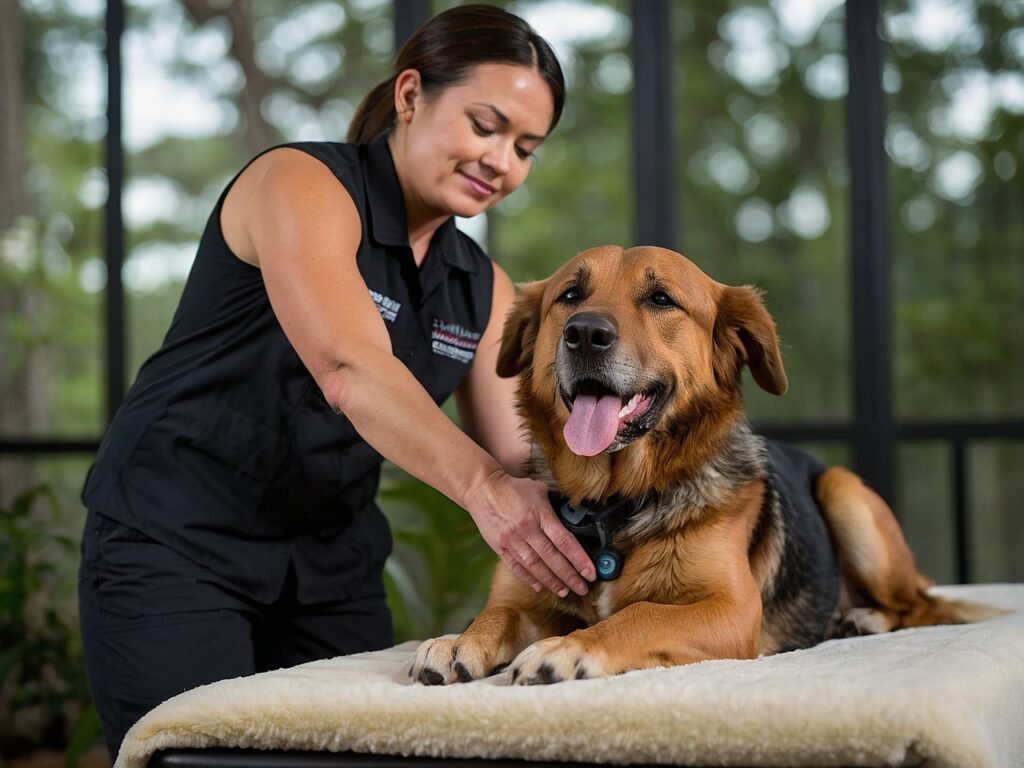
Music and Aromatherapy
Certain types of music and scents can have a calming effect on dogs.
- Calming Music: Music designed specifically for dogs, such as classical music or specially composed dog relaxation music, can help soothe anxiety.
- Aromatherapy: Some smells or oils can have calming properties, but it’s essential to ensure they are safe for pets and used correctly (consult with a vet first before trying).
Behavioral Therapy
For dogs with severe anxiety or stress, professional help may be necessary. Veterinary behaviorists or professional dog trainers can provide tailored strategies and therapies to address your dog’s specific needs.
- Behavioral Consultation: A veterinary behaviorist can diagnose and develop a treatment plan for anxiety and stress-related behaviors.
- Training Programs: Enrolling your dog in a training program can help address behavioral issues and provide mental stimulation.
Proper Socialization
Gradual and positive exposure to different environments, people, and other animals can help dogs build confidence and reduce stress.
- Controlled Exposure: Slowly introduce your dog to new experiences, ensuring each interaction is positive. We want pups to go out in the world and be happy. That being said, read your pup’s body language. Step back from things that trigger stress — introduce it from a distance. Not every pup needs to meet all people and other dogs. Be your puppy’s leader and champion.
- Socialization Classes: Socialization classes, doggy daycare or structured group activities at a dog park or elsewhere can provide controlled environments for social learning.
Adequate Rest
Ensuring your dog gets enough rest is crucial for stress management. A tired dog is more likely to be stressed and irritable.
- Comfortable Sleeping Area: Provide a quiet and comfortable place for your dog to sleep.
- Regular Sleep Schedule: Maintain a consistent sleep schedule to help regulate your dog’s internal clock.
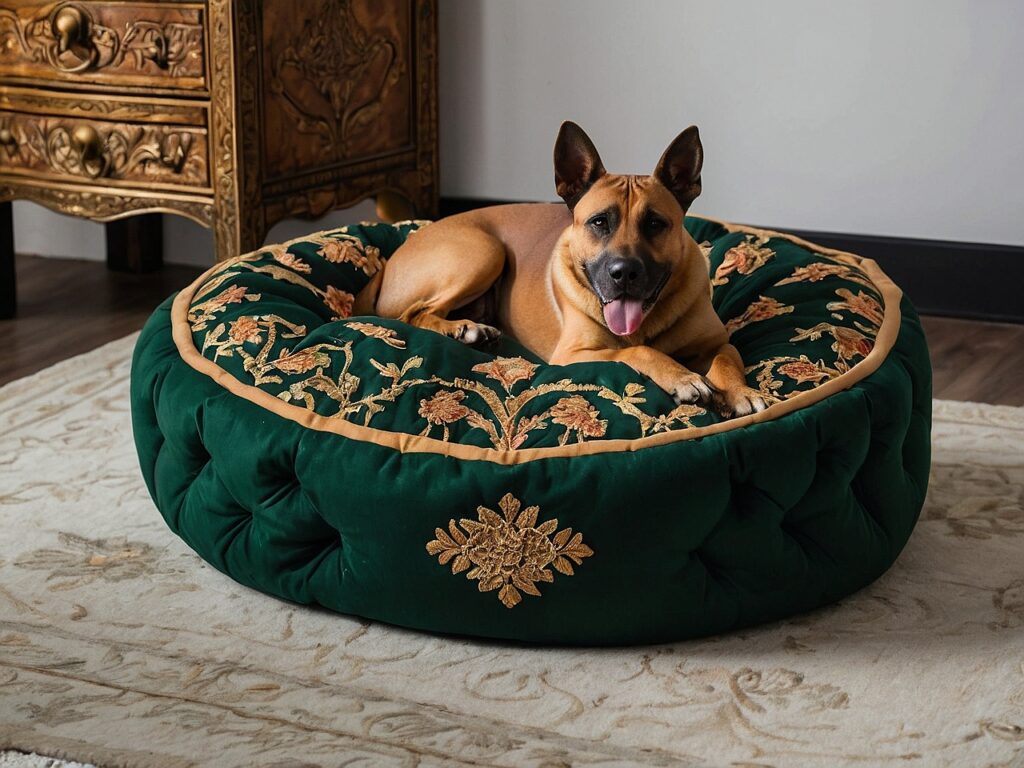
Managing Your Dog’s Stress
Stress in dogs is a common issue, but with the right techniques, it can be effectively managed. By incorporating regular exercise, maintaining a routine, providing a safe space, offering mental stimulation, and using positive reinforcement, you can significantly reduce your dog’s stress levels. For more severe cases or if you’re just looking for extra help, consulting with a veterinary behaviorist or professional trainer can provide specialized help.
Remember, every dog is unique, and what works for one dog may not work for another. It’s essential to observe your dog’s behavior and adjust your approach as needed. With patience, consistency, and a lot of love, you can help your furry friend lead a stress-free and happy life.
While there are many effective stress reduction techniques that pet owners can implement at home, sometimes professional training is the best solution. Performance K9 Training and Boarding’s Basic Behavior Modification Program offers a structured and comprehensive approach to help dogs overcome stress and anxiety, leading to happier, healthier lives for both dogs and their owners. PK9’s experienced trainers use positive reinforcement methods, tailored individual assessments, controlled socialization, and owner education to ensure long-term success. By investing in professional training, pet owners can ensure their furry companions receive the proper care and support they need to thrive. Contact Performance K9 Training and Boarding today to get a free consultation for your pup!




